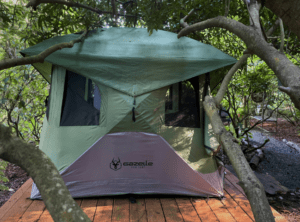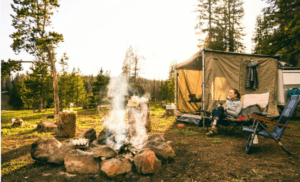Introduction to Camping and Why it’s Important to Have the Right Gear
Camping is more than just a getaway; it’s an adventure that reconnects you with nature and yourself. Picture this: waking up to the sound of birds chirping, the sun peeking through trees, and a gentle breeze brushing your face. But before you dive into this outdoor paradise, having the right gear is crucial.
The right equipment can make or break your camping experience. It ensures comfort, safety, and enjoyment as you explore rugged trails or relax by the campfire. Whether you’re a seasoned camper or trying it for the first time, packing strategically will enhance your trip immensely. Let’s delve into what essentials you’ll need to bring along to create lasting memories under the stars!
There’s something magical about camping. The call of the wild, the crackle of a campfire, and the beauty of nature can rejuvenate your spirit like nothing else. But let’s be honest: a successful camping trip hinges on one critical factor—the right gear.
Imagine setting up your tent in pouring rain or realizing you forgot to pack enough food as night falls. These scenarios can turn what should be an adventure into an ordeal. That’s why having essential camping gear is not just important; it’s vital for creating unforgettable memories under the stars.
Whether you’re a seasoned camper or planning your first getaway, packing wisely makes all the difference. So, grab a notebook and get ready to explore everything you need for your next outdoor escape!
Shelter: Tents, Sleeping Bags, and Sleeping Pads
Choosing the right shelter is crucial for a successful camping trip. Tents come in various shapes and sizes, catering to solo adventurers or large family outings. When selecting a tent, consider waterproof materials and ease of setup.
Sleeping bags are equally essential. They vary in insulation types and temperature ratings. It’s important to pick one that matches the climate you’ll encounter. Remember, comfort can make all the difference after a long day of hiking.
Don’t overlook sleeping pads either; they provide insulation from cold ground while adding a layer of comfort. A good pad will help you wake up refreshed instead of achy.
With these essentials in hand, you’re well on your way to enjoying restful nights under the stars.

Cooking Equipment: Stove, Utensils, and Food Storage
When you’re out in the wild, cooking can become an adventure of its own. A portable stove is a must-have for easy meal prep. Look for lightweight options that pack away easily but still deliver reliable heat.
Don’t forget your utensils. A good set will include everything from spatulas to tongs and knives. Multi-functional tools are especially handy when space is limited.
Food storage also plays a crucial role in keeping your meals fresh and safe. Invest in airtight containers or resealable bags to prevent spoilage and minimize critter encounters during the night.
Consider bringing along a small cooler if you plan on packing perishables like meat, dairy, or fresh veggies. Keeping these items chilled ensures you’ll have tasty ingredients at your fingertips throughout the trip.
With the right cooking gear, campfire meals can be both delicious and satisfying after a day outdoors.
Clothing and Footwear for Different Weather Conditions
When planning your camping trip, selecting the right clothing is vital. Weather can change rapidly in the great outdoors. Layering is key to staying comfortable.
Start with moisture-wicking base layers that keep sweat away from your skin. This helps regulate body temperature during hikes or chilly nights by keeping you dry.
Mid-layers like fleece jackets provide warmth without bulk. They work well for those cooler evenings around the campfire.
Don’t forget a waterproof and windproof outer layer. A good jacket shields against rain and gusts, ensuring you stay dry and protected.
Footwear matters just as much as clothing. Sturdy hiking boots offer support on uneven trails while breathable socks prevent blisters.
Pack a warm hat and gloves if temperatures drop at night or during early mornings. Accessories can make all the difference in comfort levels on your adventure!
Navigation Tools: Maps, Compass, and GPS Devices
When venturing into the great outdoors, having reliable navigation tools is essential. Maps and compasses may seem old-fashioned, but they provide a solid understanding of your surroundings. A good map highlights trails, water sources, and elevation changes.
Compasses are simple yet effective. They help you orient yourself and ensure you’re heading in the right direction. Pairing these two can enhance your backcountry skills significantly.
Modern technology offers GPS devices that bring convenience to navigation. These gadgets show real-time locations on digital maps, making it easy to track progress during hikes or camping trips.
However, electronics can fail due to dead batteries or signal loss in remote areas. It’s prudent to carry traditional maps alongside any tech gear as a backup plan. Being prepared ensures you won’t lose your way while enjoying nature’s beauty.
When venturing into the great outdoors, having reliable navigation tools is essential. Whether you’re exploring well-marked trails or wandering off the beaten path, knowing how to find your way can make all the difference.
Maps are a classic resource that every camper should carry. They provide an overview of the terrain and help you identify landmarks, campsites, and water sources. Make sure to choose detailed maps specific to your camping area.
A compass is another vital tool for navigation. While technology may dominate our lives today, understanding how to read a compass can guide you through areas where signals might fail. Practice using it before your trip so you feel confident when navigating unfamiliar landscapes.
For those who prefer tech-savvy options, GPS devices offer precision and convenience. Many models come with pre-loaded topographical maps and additional features like route planning and waypoint marking. Just remember: batteries die, so always have a backup plan in place.
Having these navigation tools at hand ensures that you’ll not only enjoy nature but also return home safely after each adventure. Embrace the journey ahead!


Safety Precautions: Bear
When you venture into the wild, safety should always be at the forefront of your mind. One of the most significant risks in many camping areas is wildlife encounters, particularly with bears. These magnificent creatures are often drawn to human food and waste, making it crucial to take precautions.
Begin by understanding bear behavior and their habitats. Familiarize yourself with local regulations regarding bear activity in your area. Always store food properly by using bear-proof containers or hanging food from a tree at least 10 feet off the ground and away from your tent.
It’s wise to cook away from your sleeping area and clean up immediately after meals. The aroma of cooking can attract bears from considerable distances, so ensure that all scraps are disposed of securely.
Bear spray is an essential item for any camper heading into bear country. It acts as a deterrent during unexpected encounters. Practice how to use it before hitting the trails; being prepared can make all the difference.
Staying alert while hiking is also key—make noise when you’re walking through dense brush or areas where visibility is limited, especially if you’re traveling alone or in small groups. This way, you’ll minimize surprise encounters.
By taking these steps seriously, you’ll enjoy peace of mind on your camping adventure while respecting nature’s beautiful but sometimes unpredictable inhabitants.








